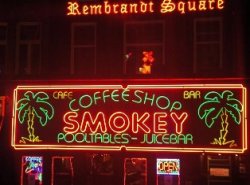Amsterdam Cannabis Cafes Closing? End of Amsterdam Coffeeshops Near?
Will Amsterdam cannabis cafes soon be a thing of the past? Is the end of the coffeeshops in Amsterdam near? Hundreds of visitors planning their trip to Amsterdam ask us this question.
Don't worry. Amsterdam cannabis cafes, more correctly known as coffeeshops where you can legally buy the famous Amsterdam weed, are not going anywhere in a hurry. (You can find the best in our Amsterdam coffee shop reviews, and locate them quickly through our Amsterdam coffee shop map.)
This page explains the situation.
The School Distance Issue

The most recent scare involving Amsterdam cannabis cafes came from an announcement in late 2008 that Dutch authorities wished to close coffeeshops operating within 250 meters of a school. While this is true, there is no reason to panic just yet.
While Amsterdam's mayor, Job Cohen, bowed to pressure from the national government to enforce this policy, he did so with much public reluctance. Mr. Cohen has stated that he would side with local business owners in resisting any attempts to constrain one of the city's best-known industries.
The policy was initially supposed to close Amsterdam cannabis cafes within 500 meters of high schools, but this was considered too extreme; as was closing coffeeshops located close to primary schools, which would have resulted in a great many businesses having to shut down. Besides, observers have pointed out that there are also many brothels and gambling halls in the same short distance to Amsterdam schools. If your school is in the heart of the Amsterdam city center, it's impossible not to be.
Despite these factors, a few casualties were unavoidable. Most noticeably, the prominent Bulldog coffeeshop on Leidseplein will probably have to close its doors in the near future due to its proximity to Barlaeus Gymnasium.
Border Towns
Some Dutch coffeeshops operating in towns close to the Netherlands' borders have been closed down in an effort to prevent 'drug tourism' from neighboring Belgium and Germany. Many local governments operate a zero policy on cannabis cafes, meaning that in lots of towns none opened in the first place.
But the Amsterdam coffeeshop scene faces little threat from this phenomenon. Being located far from the borders of other countries, as well as being a major metropolitan city, with appropriately more liberal attitudes, means that Amsterdam cannabis cafes are not affected by this in the foreseeable future.
Who is Responsible?
While it is unfair to look for one group that is responsible for efforts to close Amsterdam coffee shops, many anti-coffeeshop policies have originated from the Christian Democrats (CDA). The CDA are since long the biggest political party in the Netherlands and their conservative views are at odds with coffeeshop culture.
Other groups opposed to Amsterdam cannabis cafes include a small orthodox Protestant party (who are now part of the Dutch government coalition) called the Christian Union (CU), as well as some local authorities in other parts of the Netherlands.
Much as it may worry visitors planning to visit Amsterdam and explore its coffeeshops, democratic organizations like these have the right to pursue their agendas within their jurisdictions. In the end, any policy changes in the Netherlands are a result of the Dutch democratic system and the decisions rest with the Dutch people as a whole.
Coffeeshop Control
As it stands, Amsterdam cannabis cafes operate within a strict web of rules and regulations to ensure that everything they do is above board. Coffeeshops must possess a licence from the local authorities, an agreement reached between authorities and the coffeeshop union, Bond van Cannabis Detaillisten (BCD).
Coffeeshop licences are non-transferable and set at a fixed amount; no new coffeeshop can open without obtaining a licence from an existing coffeeshop. In addition, if a coffeeshop has its licence revoked, as a result of serving minors, allowing hard drugs on the premises etc., that licence is then gone forever, leaving the total number of Amsterdam cannabis cafes one less permanently.
For these reasons, Amsterdam coffeeshop owners and staff themselves are often the most dogged enforcers of the rules; nobody wants to see the city lose another coffeeshop, or risk bringing more trouble down on the cannabis cafe scene.
The Future?
We aren't clairvoyants, so it's impossible to say what the future holds for Amsterdam coffeeshops. While the city's mayor is sympathetic, the national government wants to limit the coffee shops (but not totally abolish them).
The fact of the matter is, most Dutch politicians recognize that the Dutch coffee shop policies have been successful. From the beginning, coffee shops were allowed in the open so they could be controlled, and the soft drugs scene would remain separated from the hard drugs scene (heroin, cocaine, etc.).
This has clearly worked. Research shows that in countries with much harsher drugs laws (the USA, the UK and France) drug use is more widespread among the population than in the Netherlands. This goes for almost all age groups and all types of drugs. Allowing soft drugs also frees up police time and resources to combat the real threat posed by heroin and other hard drugs.
Regardless of these arguments, there will always be those who feel that Amsterdam cannabis cafes represent a threat to the social fabric of the Netherlands, and would like to see them all removed. They are a minority in the Netherlands and this isn't going to change anytime soon.
For now, don't listen to the rumor mill. Anyone visiting Amsterdam will see that the coffeeshop scene is alive and kicking here. Why not come over and see for yourself?
Related Pages:
- Introduction to Amsterdam coffee shops
- Amsterdam coffee shop reviews
- A handy Amsterdam coffee shop map, listing only the best
- The history of coffee shops in Amsterdam
- Introduction to drugs in Amsterdam
- Read about the annual Amsterdam Cannabis Cup, one the biggest cannabis events of the world
- The famous Bulldog Cafe Amsterdam
- What are the long-term effects of smoking weed?
- Amsterdam smartshops: where to find them
- From Amsterdam cannabis cafes back to Amsterdam Advisor

 Subscribe To
Subscribe To
